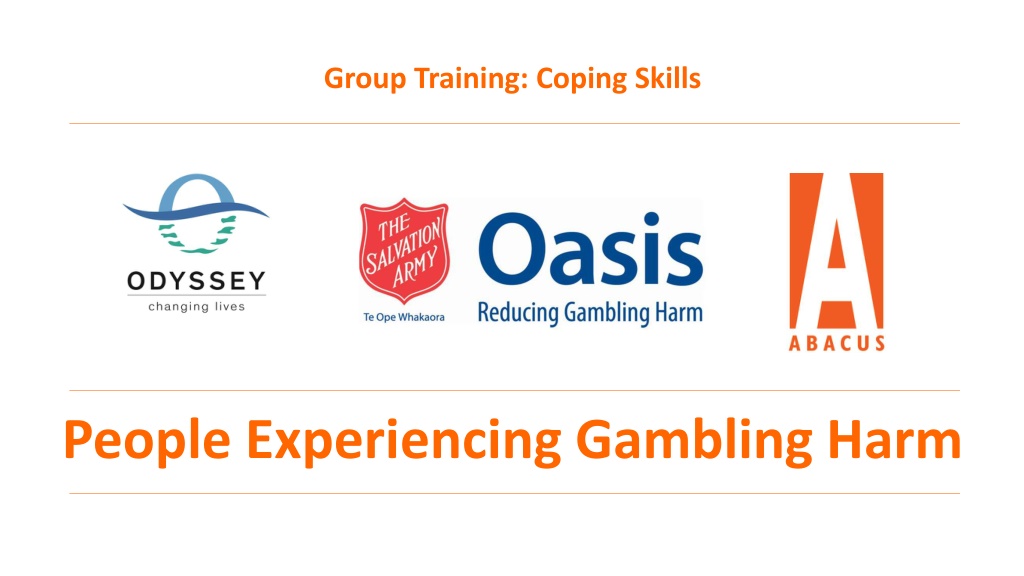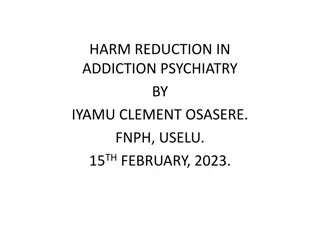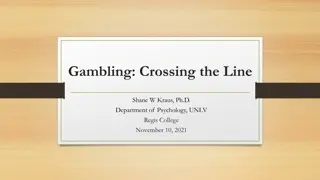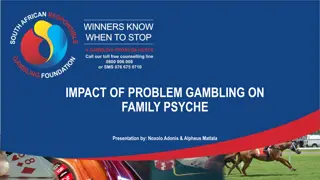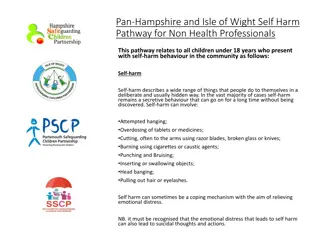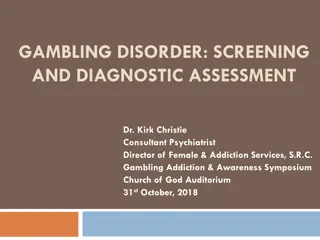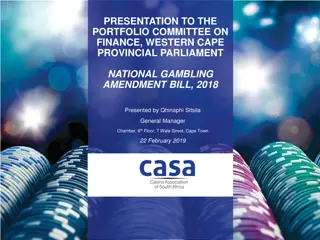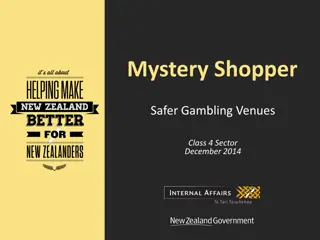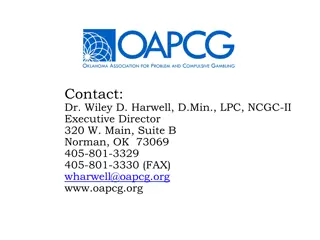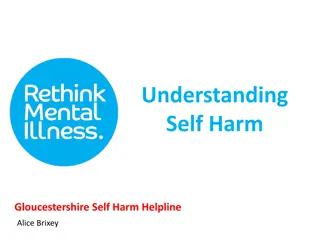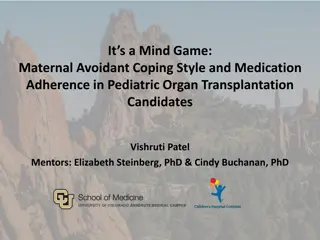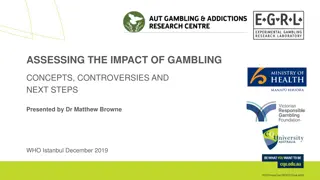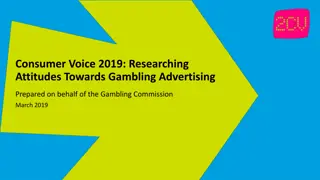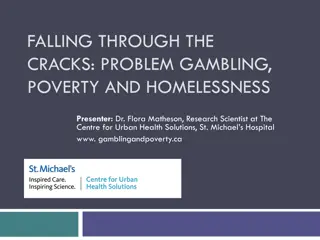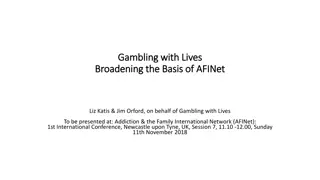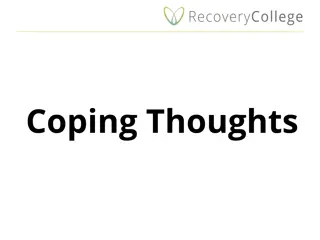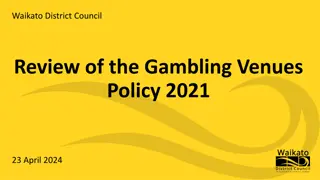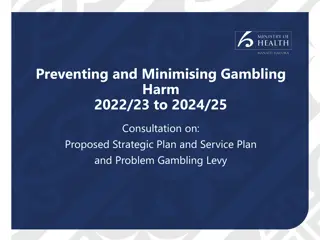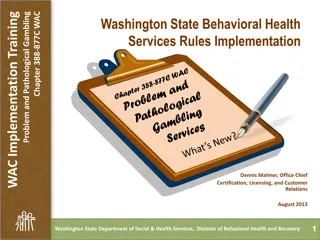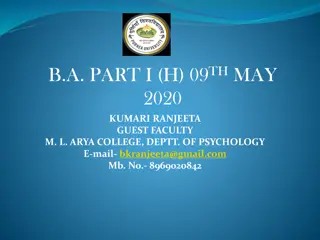Group Training: Coping Skills for Gambling Harm
This group training program focuses on developing coping skills for individuals experiencing harm from gambling. It includes sessions on assertiveness, communication, CBT, grief management, budgeting, relaxation, leisure, and relapse prevention. Participants learn about active listening, setting boundaries, and saying no effectively. The program emphasizes mutual support, respect, and confidentiality within the group setting.
Download Presentation

Please find below an Image/Link to download the presentation.
The content on the website is provided AS IS for your information and personal use only. It may not be sold, licensed, or shared on other websites without obtaining consent from the author.If you encounter any issues during the download, it is possible that the publisher has removed the file from their server.
You are allowed to download the files provided on this website for personal or commercial use, subject to the condition that they are used lawfully. All files are the property of their respective owners.
The content on the website is provided AS IS for your information and personal use only. It may not be sold, licensed, or shared on other websites without obtaining consent from the author.
E N D
Presentation Transcript
Group Training: Coping Skills People Experiencing Gambling Harm
Week One: Assertiveness and Communication General outline Odyssey | The Salvation Army Oasis | ABACUS
Welcome and Introductions Opening of group and session one (volunteer) Who we are/what we do and Going around the group: Something about me that no-one else will know Purpose for attending/main goal Odyssey | The Salvation Army Oasis | ABACUS
Outline of the six-week programme Week one: Assertiveness and Communication Week two: CBT/Management of feelings Week three: Grief and change Week four: Budgeting/Lifestyle/Legal Week five: Relaxation and leisure Week six: Relapse Prevention Odyssey | The Salvation Army Oasis | ABACUS
Rules and Guidelines for our Group Group round - what is most important for everyone? Confidentiality Safety how do we keep everyone safe? Any individual needs? Having your say/listening Mutual respect Mutual support Odyssey | The Salvation Army Oasis | ABACUS
Assertiveness and Communication We re all somewhere on this line: Passive Aggressive Assertive (discuss) Bill of Assertive rights (handout) Exercise: Talker and Listener (one and two) in pairs and feedback to group how they both felt Active listening (handout discuss) Odyssey | The Salvation Army Oasis | ABACUS
Assertiveness in Relationships Constructive communication and giving feedback (refer to handout) Exercise: giving feedback (pairs) select a scenario chosen by the group The importance of being able to say no and its importance in relapse prevention e.g. avoiding gambling situations by saying no at the right time Can set up a role-play with someone suggesting going to the pub for a drink (the local where you gambled) and the partner finds a way to decline invitations Feed back to group Odyssey | The Salvation Army Oasis | ABACUS
Week Two: CBT/Management of feelings Learning to cope with feelings without gambling Odyssey | The Salvation Army Oasis | ABACUS
Feelings Feelings are not right or wrong they happen what you do with them counts How you act on a feeling is a choice Feelings are influenced by what we believe about ourselves, others and situations The ABC of CBT (handout - discuss) Discuss: Processing feelings in positive ways (thoughts that generate feelings can be changed, with positive results) How can this influence actions in future in regard to gambling? Odyssey | The Salvation Army Oasis | ABACUS
Assertive vs aggressive People often get confused between the two Aggressiveness is getting your own way at the expense of others I win, you lose Assertiveness is asking directly for what you would like, without stepping on someone else s toes /taking away their rights caring about others as well as you this is win-win There are short and long-term consequences for behaving in aggressive, passive aggressive (indirect), passive, and assertive ways over time shown on next slide Odyssey | The Salvation Army Oasis | ABACUS
Short and Long-Term Outcomes of being Passive/Aggressive Behaviour Short-term Long-term Passive Less friction and conflict Frustration, powerlessness Resentment self and others Build-up of resentment; mental and physical stress; depression; self-pity Unable to make decisions; have a viewpoint Indirect (passive- aggressive) Power and success Desired outcome Dishonest/sneaky; misunderstood? Relationships built on deceit/manipulation Dishonesty to cover up past behaviours Reputation of insincerity; untrustworthy Assertive May be more conflict/doubt about assertive rights Self-respect, confidence, honesty Empowerment Relationships built on honesty and respect Confidence and independence Know where you stand with them Aggressive Power and satisfaction Get rid of angry feelings Success at the cost of shame/disappointment; relationships Habitual use of aggression to get needs met Intolerance of defeat Success through abuse of power Self-disgust Odyssey | The Salvation Army Oasis | ABACUS
Resolving Conflict Respectfully (De-escalation skills) Discuss how use of body language can reduce/avoid conflict (includes attention to communication skills congruency of facial expression, tone, content etc.) Body language role-play exercise negotiating personal space boundary; how sitting down, avoiding head-on stances/eye contact etc. can de-escalate Use of Reframing (handout) discuss Role-play of a reframing example Odyssey | The Salvation Army Oasis | ABACUS
Week Three: Grief and Change Grief and Loss in addictions Odyssey | The Salvation Army Oasis | ABACUS
Grief and Loss The five stages of grief (handout) The impact of loss of addictions coping mechanisms (handout) Discussion and group sharing of impacts from members experience Odyssey | The Salvation Army Oasis | ABACUS
Trauma, Mental Health and Addictions The connection between childhood trauma, adult trauma and addictions The ACE (adverse childhood experience) study and what it showed (handout) and how it relates to addictions and mental health Depression and anxiety (handout discuss possible lifestyle changes) Odyssey | The Salvation Army Oasis | ABACUS
Motivation for Change Ambivalence about change (handout) Internal and external motivation (handout) Pros and cons of change (Decisional balance) pairs exercise. Use the template provided, to talk about group members personal motivation for change Odyssey | The Salvation Army Oasis | ABACUS
Week Four: Budgeting, lifestyle, Legal Managing lifestyle, finances and legal problems Odyssey | The Salvation Army Oasis | ABACUS
Impact of Gambling Addiction on Others Financial and other impacts on others of gambling harm: (see handout) Partners/relationships Family/whanau Children Group sharing round on personal experiences Odyssey | The Salvation Army Oasis | ABACUS
Budgeting/Financial literacy Group round: How many in the group would consider themselves good money managers ? How many in the group used a budget to manage money? Would it have made a difference to your gambling to know how much money/where it was being spent? How can budgeting be used to prevent excess spending (e.g. on gambling) in future? Odyssey | The Salvation Army Oasis | ABACUS
Lifestyle Balance, Mental and Physical health Group feedback - what is lifestyle balance? Self-care is essential for good physical and mental health (discussion) How do addictions affect lifestyle balance? What is needed to address the balance and get back on track? What supports are available? Odyssey | The Salvation Army Oasis | ABACUS
Legal Issues What sort of issues are likely to be associated with gambling? Comment from the group on their experience of legal problems with their gambling How can you get support for legal problems connected with gambling? What about legal issues for significant others from another s gambling? (discuss) Odyssey | The Salvation Army Oasis | ABACUS
Week Five: Relaxation and Leisure Relief of stress during recovery from gambling harm Odyssey | The Salvation Army Oasis | ABACUS
Finding Alternatives for Your Time after Stopping Gambling Group round: things that you used to do before you started gambling to the point that it became a problem and it occupied your thinking and time What activities from those things would you like to pick up on again? (discuss) What are some things you have always wanted to do but didn t get around to? (brainstorm all possibilities without limiting options) can use whiteboard Odyssey | The Salvation Army Oasis | ABACUS
How to Deal With Stress The ABC model of stress (handout) Thinking Errors and how they contribute to stress (Refer to handout and discuss) Group round on which thinking errors affect group members Which ones are important to change for participants? Odyssey | The Salvation Army Oasis | ABACUS
How to Deal With Stress Breathing and Relaxing Exercises demonstrate one example in the group read out an example and elicit feedback from the group re their experience Sleep how does stress from addictions interfere with sleep and what are some ways to deal with that? (group discussion) Resources for ongoing support what can you identify that you want resources/support for? What further information do you need? Odyssey | The Salvation Army Oasis | ABACUS
Week Six: Relapse Prevention Staying on Track keeping yourself safe Odyssey | The Salvation Army Oasis | ABACUS
Developing a Personal Relapse Prevention Plan Group round: What are the most important considerations in your plan? Who can help/support you in making a relapse prevention plan? The Gambling Diary shown on the next slide may help you identify high-risk situations, early warning signs and people/relationships that make you more at-risk of gambling relapse. Exercise: filling out a diary and getting feedback Odyssey | The Salvation Army Oasis | ABACUS
Gambling Diary (mood monitor) CBT Tool Who with How I felt before How I felt after Day Time Place What $ lost 12 - 1pm pub myself $60 craving frustrated pokie lunch pokies Mon 5 - 8pm club Joe $160 Bored angry (losses) Tues pokies, raffles, texas hold em Stressed, worried disappointed, guilty Wed 7 10 pm club Joe $200 Odyssey | The Salvation Army Oasis | ABACUS
Cues and Triggers Group round: Share some of the things that you remember would influence you to gamble, for example, passing a venue with gambling machines, seeing TAB ads on TV, being on the internet and seeing pop-ups etc Group discussion: Places, people, situations you think you need to avoid in future Look at the handouts provided and identify which situations you relate to most and feed back to the group Odyssey | The Salvation Army Oasis | ABACUS
Early Warning Signs These are emotions or feelings that have led to gambling in the past, and when you identify these, it is time to take early action to prevent gambling. What are some of the emotions/feelings you are now aware of that could put you at risk of gambling in future? Comment on the role of personal stress in feelings of wanting to gamble in order to switch off negative thoughts and feelings? What are some of the ways to deal with stress in your life? (group discussion) Odyssey | The Salvation Army Oasis | ABACUS
High-Risk Situations Group round: Share some of the high-risk situations you would be concerned about in future. What arrangements would be most helpful in regard to having access to money ? What plans have you made/you think you would like to make in regard to access to venues where gambling is available? Who can provide support and give feedback to you about attitudes and behaviours that may lead to putting yourself in risky situations? Odyssey | The Salvation Army Oasis | ABACUS
Maintenance of Change As previously mentioned, lifestyle change is hard, and people can change when they become motivated Often, maintaining change is the hardest part What can go wrong and overturn efforts to make lasting change? Group round on attempts to make changes in the past Each time you make a relapse prevention plan, taking into account things that went wrong that you didn t anticipate, does that lead to a stronger, more effective plan? 32 Odyssey | The Salvation Army Oasis | ABACUS
Setting Personal Goals Take stock of your situation: marital and social status, family and friends, work and obligations, debts and expenses, hobbies and interests etc. What are the things in my lifestyle you want/need to change? What are the risks and situations you need to avoid? How do you want to fill your leisure time? What are your values/most important things in your life? What are the things that are going well that you want to continue? How would you like your life to be in one year; five years? Knowing these can help you plan what you need to start doing/changing. Odyssey | The Salvation Army Oasis | ABACUS
Identifying Goals (can use CBT tools) Goals List (Planning is linked to personal goals) What could get in the way- barriers What I can do to remove barriers Who could help and support me Example: Finding alternative activities to gambling My partner; my friends; check the internet for possibilities Identify interests and join a group or club Don t have any hobbies Odyssey | The Salvation Army Oasis | ABACUS
Services providing help for gambling harm Gambling Helpline: free call in NZ (0800 654 655) National face-to-face services: Salvation Army Oasis Problem Gambling Foundation Cultural services (Auckland): Te Piringa Tupono at Raukura Hauora o Tainui (Maori service) Tupu (Pacific service) Pasifica Ola Lelei at South Seas (Pacific service) Asian Family Services All services offer help to family members as well as those suffering gambling harm Odyssey | The Salvation Army Oasis | ABACUS
